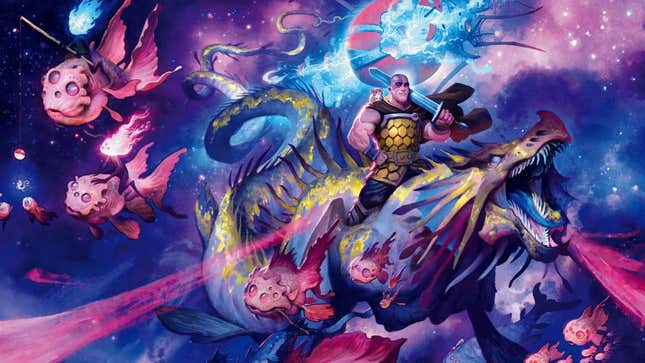
Update 09/06/2022 12:15 p.m. ET: Late in the evening of September 2, Wizards of the Coast released a statement apologizing and acknowledging the “inclusion of offensive material” in the Astral Adventurer’s Guide, saying that the company “failed you, our players, and our fans.”
In the statement, the company said that “regrettably, not all the portions of the content relating to the Hadozee were properly vetted.” Wizards stated that the hadozee content that sparked criticism “will no longer be included in future reprints of the book.”
Attached to the statement was a downloadable errata PDF of the hadozee section of the Astral Adventurer’s Guide, with the offensive hadozee backstory removed.
Original story follows.
Dungeons & Dragons publisher Wizards of the Coast has quietly removed language from its newly released Spelljammer setting that came under fire for racist overtones. While its D&D Beyond online tools no longer contain references to a primate-like race becoming “sapient” through enslavement, the already-published physical books still contain the problematic language, as well as depictions of a primate-like race that closely mirror the racist imagery of minstrel shows.
The new Astral Adventurer’s Guide, a setting source book for the revived Spelljammer setting, was published last month. The book swiftly drew criticism for its depictions of a primate-like race whose backstory involves enslavement and forced experimentation to alter and advance their physical and mental capacities. A variety of outlets have highlighted the issue, while many D&D players and experts took to Twitter to express frustration and confusion over what is an ongoing racism problem that dates back to the origin of the game itself.
Kotaku has reached out to Wizards of the Coast for comment.
Dungeons & Dragons is no stranger to issues concerning race and representation. But despite a history of problematic and directly racist depictions of peoples in its fictional worlds, the new Astral Adventurer’s Guide offers up lore that includes the “hadozee.” These are a race of primates who, through slavery and forced experimentation, become “sapient.” This fictional history was also accompanied by imagery that mirrors real-world racist, anti-Black imagery from 19th and 20th century minstrel shows.
Wizards of the Coast has stealthily removed references to slavery in the online rules found on D&D Beyond, its online storefront that offers both digital rulebooks and tools such as dice and character sheets. However, the company hasn’t made any indication that it will print updated versions of the physical books, and the controversial artwork can still be seen in various entries on the site.
The company hasn’t made any public statements concerning the hadozee race or the stealthy D&D Beyond updates. It has, however, been regularly updating players on the status and updates of the “One D&D” playtest, which includes the term “Race,” for one of the game’s mechanic—a word many other publishers of TTRPGs have dropped as a part of a larger effort to address the legacy of racist language in tabletop role-playing games.
This latest concern over racist overtones in D&D follows a public commitment from the publisher to address its legacy of systemic racism in its products and to do so in a transparent way. In 2020, Wizards of the Coast released a statement in which it committed to making products that better reflect the diversity of its players. It also pledged to reprint recent books such as Curse of Strahd and Tomb of Annihilation, which had also come under scrutiny for what Wizards itself described as “racially insensitive” text. In its 2020 announcement addressing diversity and the legacy of racism in its products, Wizards also made the following commitments:
We’ve received valuable insights from sensitivity readers on two of our recent books. We are incorporating sensitivity readers into our creative process, and we will continue to reach out to experts in various fields to help us identify our blind spots.
We’re proactively seeking new, diverse talent to join our staff and our pool of freelance writers and artists. We’ve brought in contributors who reflect the beautiful diversity of the D&D community to work on books coming out in 2021. We’re going to invest even more in this approach and add a broad range of new voices to join the chorus of D&D storytelling.
Sensitivity readers, diverse staff, and changes to in-game language have all been part of the larger efforts of TTRPG companies to create more inclusive and less insensitive material. Yet, the most famous role-playing game in the world, with the clearest history of racist fiction and mechanics, continues to struggle.